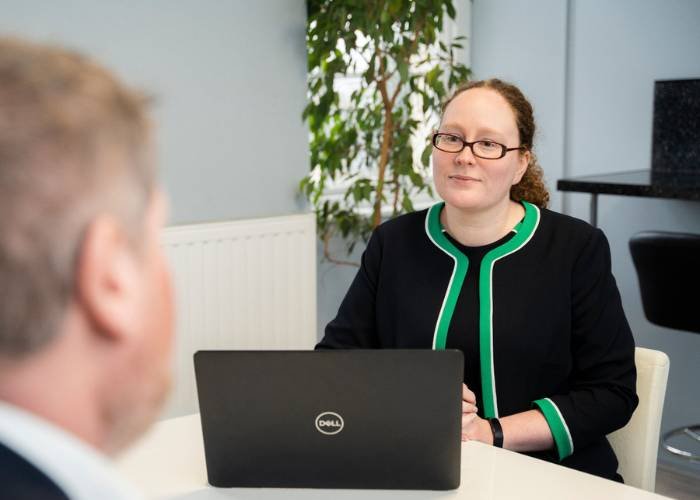Probate Solicitors in Plymouth
Estate Administration Advice & Grant Assistance
Losing someone you love is never easy, and when you are faced with the task of sorting out their estate, it can feel like a huge responsibility. Our experienced probate solicitors in Plymouth help families to manage the practical and legal side of things with care and compassion. Whether you need help applying for a Grant of Probate, dealing with inheritance tax, or managing the full administration of an estate, our local team will guide you through every step. We will take the time to listen, to understand your situation, and to make things feel a little easier at a time when so much feels difficult.
arrow_back Back to Wills, Trusts, Tax and Probate
Helping families through life’s most difficult times
At Nash & Co Solicitors, we know that probate is about more than paperwork. It is about helping families through an emotional and often overwhelming period of their lives. Our team is here to ease that burden. We can help you apply for a Grant of Probate, manage the full administration of an estate, deal with inheritance tax, and ensure that everything is done correctly and with care. We explain things clearly, avoid jargon, and keep you informed at every step so you always know what is happening.
Based in Plymouth and trusted by families across Devon and Cornwall, we have supported people through all kinds of estate situations. Whether the estate is straightforward or complex, our focus remains the same: to handle the legal side with professionalism and sensitivity, while giving you the space to focus on what matters most. Many clients tell us they value our calm, kind approach and the reassurance of having someone local they can trust to guide them.
Our related Wills, Trusts, Tax and Probate Services
Understanding Probate
When someone dies, their money, property and possessions make up what is known as their estate. Probate is the legal process of dealing with that estate. It involves collecting the assets, paying any debts or taxes, and distributing what is left to the people who are entitled to it.
If the person who has died left a valid will, it usually names one or more executors. They are responsible for carrying out the wishes set out in the will. Before they can do this, they often need legal authority from the court, known as a Grant of Probate.
If there is no will, the estate is handled by an administrator, and a different document is issued called Letters of Administration. Although the terminology is different, the process is very similar. In both cases, there are strict legal steps that must be followed to make sure everything is done correctly.
Our probate solicitors in Plymouth will explain everything clearly so that you understand what is involved and what needs to happen next.
What is a Grant of Probate?
A Grant of Probate is an official document that gives the executor legal authority to deal with the deceased person’s estate. This means they can close bank accounts, sell property, pay debts, and distribute inheritance in line with the will.
Our team can take care of the application for you, ensuring that all the necessary forms and supporting documents are completed accurately. We will also deal with HMRC and the Probate Registry on your behalf, keeping you updated throughout the process.
If you prefer, we can simply prepare the paperwork so that you can submit it yourself. Many families find this flexibility reassuring, as it allows them to stay involved while still receiving expert help.
What are Letters of Administration?
When someone dies without a valid will, they are said to have died intestate. In these cases, there are no executors, so an administrator must be appointed instead. The document that gives them this authority is called Letters of Administration.
We can guide you through the entire process, explaining who is entitled to apply and how the estate will be distributed under the intestacy rules. These situations can often be more complex, especially if the family structure is complicated or there are disagreements between relatives. Our team is here to help you manage this calmly and fairly.
How our probate solicitors can help
Every estate is different, and every family’s needs are unique. Our role is to make the process simpler, clearer and less stressful for you.
Our Plymouth-based probate team can help with:
Applying for a Grant of Probate or Letters of Administration
Full estate administration, from start to finish
Completing inheritance tax forms and dealing with HMRC
Identifying and valuing assets and debts
Selling or transferring property and land
Preparing estate accounts and distributing inheritance
Advising on complex or disputed estates
Supporting families throughout Plymouth, Devon and Cornwall with local knowledge and understanding
We can handle as much or as little of the process as you need. Whether you want full support or just help with specific parts, we will tailor our service to your situation.
call Speak to one of our friendly Probate Solicitors on 01752 827067
A process built around support and clarity
Dealing with probate often involves a series of legal and administrative steps that can take time. We will guide you through each stage, explain what is happening, and keep you informed throughout.
Our process usually includes:
An initial meeting to understand your situation and what needs to be done
Gathering details of the person’s assets, debts and property
Preparing and submitting the application for probate or letters of administration
Managing the estate, paying any debts or taxes, and collecting assets
Preparing estate accounts and distributing inheritance to beneficiaries
Every case is unique, and timescales can vary. Most estates take between 9 and 18 months to complete, depending on complexity. We will always give you an honest estimate of how long things are likely to take.
Probate costs and fees
We believe in being transparent about costs from the very start. You will always know what our fees cover and what to expect. You can find our pricing structure here.
We offer a range of options depending on your needs:
Grant-only service for straightforward applications
Full administration service where we manage everything for you
Tailored assistance for complex estates or inheritance tax matters
Before any work begins, we will explain your options clearly and provide a written estimate so that you can make a fully informed decision.
Many families come to us because they want more than just legal advice. They want to be treated with kindness, respect and understanding. That is exactly what you can expect from us.
A long-established law firm based in Plymouth
Clear, jargon-free explanations at every step
Flexible services and transparent pricing
A caring, professional team who put your needs first
Our clients often tell us that they feel reassured knowing they have someone calm, professional and compassionate handling everything for them.
Why families across Plymouth, Devon and Cornwall choose us
Frequently Asked Questions about Probate
-
Not always. A Grant of Probate is usually required when the person who has died owned assets solely in their own name, such as a house, bank accounts, or investments. However, if everything was jointly owned with a surviving spouse or civil partner, or if the estate is very small, a Grant may not be necessary. Some banks and financial institutions also have their own thresholds for releasing funds without probate. Because every situation is slightly different, it is important to get advice before making assumptions. Our probate solicitors in Plymouth can review your circumstances and confirm whether a Grant is needed, helping you avoid unnecessary stress or costs.
-
When someone close to you passes away, it can be difficult to know what to do first. You might find yourself wondering where to begin, what documents you need, and which organisations you should contact. It can feel overwhelming at an already emotional time.
To start probate, you will usually need the original will (if there is one), the death certificate, and details of the person’s assets and debts. This can include information about their bank accounts, property, pensions, insurance policies, and any outstanding loans or bills. If there is no will, the process involves applying for Letters of Administration instead, and the estate will be divided according to the legal rules of intestacy.
When someone close to you passes away, it can be difficult to know what to do first. You might find yourself wondering where to begin, what documents you need, and which organisations you should contact. It can feel overwhelming at an already emotional time.
To begin the probate process, you will usually need:
The original will, if there is one
The death certificate
Details of the person’s assets, such as bank accounts, savings, property, pensions or investments
Information about any debts or liabilities, including mortgages, loans, or unpaid bills
Valuations of property or significant assets, where required for inheritance tax
Contact details for the executors, administrators or next of kin
If there is no will, the process involves applying for Letters of Administration instead, and the estate will be divided according to the legal Rules of Intestacy.
Our experienced probate solicitors can help you gather everything you need and guide you through each step of the process. We will explain what to do, who to contact, and how to complete the required paperwork. With members of STEP, Solicitors for the Elderly, and the Law Society Private Client Section within our team, you can trust that you will receive professional, sensitive, and practical support from people who understand what you are going through.
-
The time it takes to complete probate depends on several factors, including the complexity of the estate, the number of assets, and how quickly information is gathered. On average, most straightforward estates take around 9 to 12 months to finalise. More complex estates that involve property sales, inheritance tax, trusts, or overseas assets can take 12 to 18 months or more. Delays can also occur if documents are missing or if there are disagreements between beneficiaries. We will give you an honest estimate at the start and keep you informed throughout so you always know how things are progressing.
-
You can apply for probate without using a solicitor, but many people find the process time-consuming and confusing, especially when dealing with grief or family pressures. There are a lot of forms, legal steps, and tax rules involved, and mistakes can lead to long delays or personal financial liability. Using an experienced probate solicitor means everything is handled correctly, efficiently, and with care. We can take on as much or as little as you need, whether that’s simply preparing your application or managing the full estate administration on your behalf.
-
When someone dies without a will, their estate is divided according to the legal Rules of Intestacy. These rules set out who can inherit, starting with the closest living relatives. It may not always reflect what the deceased would have wanted. In these cases, someone must apply for Letters of Administration to manage the estate. This process can become complicated, particularly when there are multiple potential beneficiaries or family disagreements. Our probate team in Plymouth will explain your rights, help you understand who can apply, and guide you through every step of the intestacy process with care and professionalism.
-
Funeral costs are usually paid from the estate, provided there are sufficient funds. Most banks will release money directly to the funeral director once they receive an invoice and the death certificate, even before probate is granted. However, if the estate’s funds are limited, the person organising the funeral may be personally responsible for the costs, so it is always worth checking before making arrangements. Our solicitors can contact the bank on your behalf to confirm what is possible and make sure the process runs smoothly.
-
It is sadly not uncommon for disagreements to arise after someone’s death. These can include disputes about the validity of a will, who should act as executor, or how assets should be shared. These situations can be highly emotional and can delay the administration of the estate. Our probate solicitors will always aim to resolve matters sensitively and through open communication wherever possible. If the issue becomes more serious, we can work closely with our dispute resolution team to protect your interests and reach a fair outcome.
-
A Deed of Variation is a legal document that allows the beneficiaries of an estate to make changes to how the estate is distributed after someone has died. It can be useful when the original will, or the rules of intestacy, do not reflect what the family feel would be fair or practical. For example, someone might want to give part of their inheritance to another relative, to charity, or to help reduce inheritance tax liability.
A Deed of Variation must be made within two years of the date of death and agreed to by everyone whose inheritance is affected. It must also be set out correctly in writing and signed by all relevant parties. If the changes could affect tax, the document must be sent to HMRC.
Our probate solicitors in Plymouth regularly prepare Deeds of Variation for families across Devon and Cornwall. We will explain your options, draft the necessary documents, and make sure everything is completed properly so that the new arrangements are legally valid and tax compliant.
-
The Government’s online probate system allows some applications to be submitted digitally, but it is not suitable for every situation. If there are complications, such as inheritance tax issues, missing documents, or disputes between executors, it is often safer to apply through a solicitor. Our probate solicitors can prepare the paperwork for you and handle the application correctly, ensuring there are no errors or delays. We will also deal with HMRC, the Probate Registry and any third parties on your behalf, giving you peace of mind that everything is in order.
-
It is very common for an estate to include property that needs to be sold or transferred. The property cannot usually be sold until a Grant of Probate or Letters of Administration has been issued. Once this is in place, the executor or administrator can sign contracts and complete the sale. Our conveyancing and probate teams work closely together to manage this process efficiently. We can help with valuing the property, instructing estate agents, preparing legal paperwork, and ensuring the sale proceeds are correctly distributed to the estate.
-
Yes, but it can make the process more complex. If the person who has died owned property or investments outside England and Wales, the estate may need to go through additional legal steps in the other country. This can involve extra paperwork, translations, and sometimes separate legal representation. Our probate solicitors regularly assist families with cross-border estates and can coordinate with foreign lawyers to make sure everything is handled correctly.
-
Yes. Being an executor can be a big responsibility, and if you do not feel able to take on the role, you can formally renounce it or choose to have another executor act on your behalf. This must be done before you start dealing with the estate, as you cannot step down once administration has begun. We can prepare the necessary documents and explain your options clearly so that you can make the decision that feels right for you.
What our clients say
Related insights
Meet the Wills, Trusts, Tax and Probate Team
Get in touch
Fill out the form below and let us know whether you would like us to call you, or email you. One of our Medical Negligence team will be in touch as soon as we can. If your enquiry is urgent then please call us on 01752 827067.
arrow_back Back to Wills, Trusts, Tax and Probate























